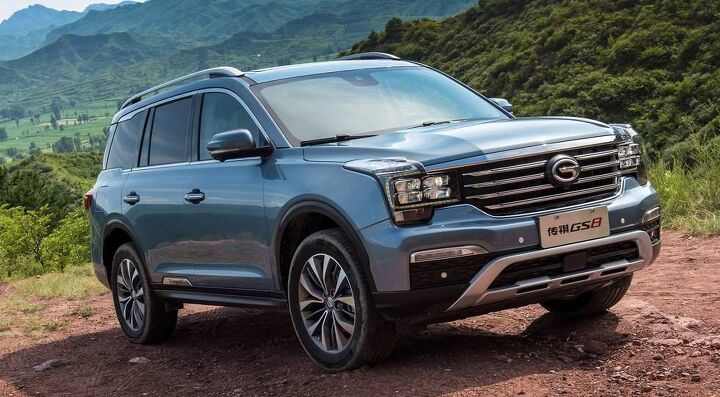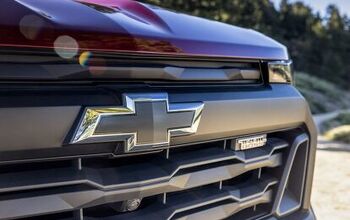When Will We See Chinese Cars On North American Roads?

It seems like we’ve been hearing about it forever — that fateful day when China surpasses the United States by every single metric imaginable and forces everyone to drive its cars. While that premonition has already come to pass in some respects, there’s still no overtly Chinese automobiles milling around on North American roads.
However, manufacturers from The People’s Republic have been looking westward for a decade. I can recall BYD Auto, along with other Chinese firms, having a booth in the basement of the North American International Auto Show way back in 2008. They weren’t there because they had nothing better to do — they were there to size up the competition and let America know they were coming. Of course, nothing happens overnight and Chinese automakers have been a little busy converting their domestic market into the world’s largest. But the time for westward expansion is fast approaching.
Geely Automotive may be among the closest to achieving the goal. Having already stated its intention to bring its Lynk & Co subsidiary to Europe and North America, it’s also the current owner of both London Taxi Co and Volvo Cars. While neither of those brands are distinctively Chinese, Volvo’s XC40 rides on the same Compact Modular Architecture as Lynk & Co’s 01 crossover.
“We have in the Western world an outrageous arrogance. We think we’re ahead. It’s going to change,” Alain Visser, senior vice president of Lynk & Co, told Reuters in a recent interview. “China is passing you at a speed that, in our arrogance, we don’t even see.”
Geely has tasked Visser specifically with the global expansion of Lynk and, so far, that strategy involves selling cars through directly-owned stores or online instead of through traditional dealer franchises. That’s going to be a little harder in the U.S., but the brand has a solution — subscription services. Volvo is even testing the waters for Lynk & Co by offering the proposed services on the XC40.
However, GAC Motor president Yu Jun recently stated that his company is still hoping to beat everyone else to the party and launch products in the American market within the next two years.
“We are building the first North America R&D Center in Silicon Valley this year and planning to enter the North American market by 2019,” he said in a release. GAC has also said it wants to have a strong presence at the 2018 North American International Auto Show and intends to bring the GA4, GA8, GM8, GS8, and a handful of concept models to Detroit next month.
Market research has positioned its likely entry point somewhere on the East Coast of the United States, with Massachusetts, Connecticut, Maine and New York being the obvious candidates. The first car it wants to sell? Probably the Trumpchi GS8 sport utility vehicle. However, its name will be adjusted to avoid any political complications. “We respect culture in the U.S. and understand there’s no precedence to use the current president’s name as a brand name,” the company explained.
It’s not going to be a silky smooth entry for Chinese automakers, however. Most countries are exceptionally wary of unproven foreign brands. Japan still isn’t particularly fond of American autos and it took the U.S. years before it was willing to accept cars developed in The Land of the Rising Sun. Meanwhile, Korean brands have only just begun to witness the softening of Western hearts.
“A key obstacle in markets like the United States is a consumer bias against Chinese-made goods,” said Jeff Cai, a Beijing-based senior director at JD Power & Associates. “Our research found most U.S. consumers think China is a third-world country that builds low-quality products.”
Further complicating the matter is China’s repeated sin of copying other country’s designs. Every Changan SUV is basically a Land Rover doppelganger; the LandWind X7 is a Range Rover Evoque, the JAC A6 is an Audi A6, the Lifan 330 is a Mini Cooper, the Kawei K1 and JAC 4R3 are both the Ford F-150, and it just goes on and on like that.
In the past, foreign companies filing claims of copyright infringement in the region are usually defeated by the Chinese government, which frequently sides with domestic carmakers. So there is little reason for manufacturers not to copy. It certainly hasn’t made anyone sympathetic to the plight of Chinese manufacturers (even those not guilty of the misdeed) trying to break into Europe and North America.
That said, we doubt it’ll be any single automaker’s undoing. Most consumers are unaware of China’s penchant for duplicating designs, and will only need to be convinced that its brands can offer a solid product for a reasonable price.
[Image: GAC]

A staunch consumer advocate tracking industry trends and regulation. Before joining TTAC, Matt spent a decade working for marketing and research firms based in NYC. Clients included several of the world’s largest automakers, global tire brands, and aftermarket part suppliers. Dissatisfied with the corporate world and resentful of having to wear suits everyday, he pivoted to writing about cars. Since then, that man has become an ardent supporter of the right-to-repair movement, been interviewed on the auto industry by national radio broadcasts, driven more rental cars than anyone ever should, participated in amateur rallying events, and received the requisite minimum training as sanctioned by the SCCA. Handy with a wrench, Matt grew up surrounded by Detroit auto workers and managed to get a pizza delivery job before he was legally eligible. He later found himself driving box trucks through Manhattan, guaranteeing future sympathy for actual truckers. He continues to conduct research pertaining to the automotive sector as an independent contractor and has since moved back to his native Michigan, closer to where the cars are born. A contrarian, Matt claims to prefer understeer — stating that front and all-wheel drive vehicles cater best to his driving style.
More by Matt Posky
Latest Car Reviews
Read moreLatest Product Reviews
Read moreRecent Comments
- AZFelix I would suggest a variation on the 'fcuk, marry, kill' game using 'track, buy, lease' with three similar automotive selections.
- Formula m For the gas versions I like the Honda CRV. Haven’t driven the hybrids yet.
- SCE to AUX All that lift makes for an easy rollover of your $70k truck.
- SCE to AUX My son cross-shopped the RAV4 and Model Y, then bought the Y. To their surprise, they hated the RAV4.
- SCE to AUX I'm already driving the cheap EV (19 Ioniq EV).$30k MSRP in late 2018, $23k after subsidy at lease (no tax hassle)$549/year insurance$40 in electricity to drive 1000 miles/month66k miles, no range lossAffordable 16" tiresVirtually no maintenance expensesHyundai (for example) has dramatically cut prices on their EVs, so you can get a 361-mile Ioniq 6 in the high 30s right now.But ask me if I'd go to the Subaru brand if one was affordable, and the answer is no.


































Comments
Join the conversation
I don't want to be that guy, but I'm going to be that guy. Half the taxis in Costa Rica are cheap Chinese sedans, the kind that makes 2007 Chryslers look like BMWs. Costa Rica is in North America, so... gotcha.
Not in a million years would I buy a Chinese car.